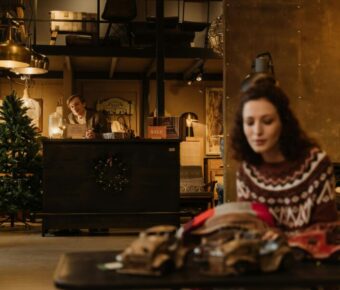
Greek Beers: 7 Unique Brews Every Traveler Must Try in Greece
Greek beers probably aren’t the first thing that comes to mind when you think about Greece, but honestly—they deserve a little spotlight. You’ll run into everything from crisp lagers to smooth pilseners by brands like Mythos, Alpha, Fix, and, if you poke around, some tiny craft labels too.
I once ducked into a tiny Athens bar, desperate for something cold, and ended up totally hooked on the local brews—way more flavor than I expected.
It’s kind of wild: beer in Greece actually goes way back to the Bronze Age, but the stuff you’ll find today is fresh, mellow, and super drinkable. If you’re heading over, try hunting down a few regional favorites—it’s one of those little joys that just makes travel better (and tastier).
Swapping your glass of wine for a cold Greek beer on a sunny afternoon? You won’t regret it.
Contents
- Key Takeaways
- The History of Greek Beer
- Early Brewing Traditions
- Modern Beer Culture
- Rise of Greek Lager
- Popular Greek Beer Brands
- Mythos Greek Lager
- Amstel in Greece
- Heineken’s Greek Presence
- Signature Greek Lagers
- 56 Isles
- Blue Island
- Ingredients Used in Greek Beer
- Barley from Greek Regions
- Unique Hop Varieties
- Greek Beer vs. Wine Culture
- Local Pairings and Traditions
- Changing Drinking Habits
- The Greek Beer Market Today
- Market Trends and Growth
- Craft Beer Scene
- Where to Enjoy Greek Beers
- Tavernas and Beach Bars
- Brewery Tours and Tastings
- Frequently Asked Questions
- What are some of the traditional beer varieties unique to Greece?
- What distinguishes Mythos beer from other Greek beers?
- Which Greek beers are considered the best by local connoisseurs?
- Can you name some Greek beer brands that are available in the USA?
- How does Alfa beer compare to other beers in the Athens beer scene?
- What are the signature beers one should try when visiting Santorini?
- More Travel Guides
Key Takeaways
- Greek beers have a deep history and unique local flavors.
- Popular brands and fresh lagers are easy to find when traveling in Greece.
- Sampling regional brews can add something special to your trip.
The History of Greek Beer

Greek beer has a backstory you might not expect, full of ancient inventions, outside influences, and the modern craving for a cold lager on a sun-soaked island.
From barley drinks in the old days to today’s breweries, you’ll notice a quirky mix of tradition and change.
Early Brewing Traditions
Ancient Greeks drank their own beer—don’t let anyone tell you it was just wine. They called it “zythos” sometimes, and it was a blend of barley, wheat, maybe a touch of honey.
It wasn’t exactly the go-to drink at those legendary feasts, though. Most Greeks back then loved their wine, and beer got a bit of a snub—it was seen as “uncultured” next to the fancier reds of Homer’s era.
Still, historians say beer bubbled away in some corners of ancient Greece, especially among the lower classes or anyone who couldn’t afford endless amphoras of wine.
Here’s a fun tidbit: Egypt actually brought beer to Greece around 332 BC. So next time you sip a Greek brew, you’re sort of time-traveling.
Modern Beer Culture
Modern Greek beer really took off in the 1800s. You can thank—or blame—the Bavarians for that.
King Otto, the Bavarian prince who became king of Greece, brought his own people over, and with them came the first breweries.
Athens got its first proper brewery in 1840. It wasn’t exactly cranking out trendy IPAs, but it got things rolling.
Breweries like Fix (founded in 1850) and Alpha followed, and slowly, beer became more than just a foreign curiosity.
These days, nearly every corner shop or beach taverna stocks a local beer. Even the old-timers who once scoffed at anything not made from grapes now clink bottles of lager.
Craft brewers are jumping in, too—maybe you’ve tried a Santorini pale ale or a honey lager on holiday. That’s the vibe now: relaxed, but always experimenting.
Rise of Greek Lager
Lager rules in Greece—there’s just something about that cold, crisp sip when the sun’s blazing down. You can’t go far without seeing Mythos, Alpha, or Fix.
These are classic Greek lagers, mostly brewed with homegrown barley, and people here love them.
Honestly, on a hot day by the sea, I’ll reach for an Alpha or Mythos over a heavy Belgian stout any time. Most Greek lagers are light, easy to drink, and don’t get bogged down with big hops or heavy flavors—just enough bite to keep things interesting.
Here’s a quick look at a few you’ll spot everywhere:
| Brand | Brewery | Notes |
|---|---|---|
| Alpha | Athenian Brewery | Mild, made with 100% Greek barley |
| Fix | Olympic Brewery | Clean, a favorite since the 19th c. |
| Mythos | Olympic Brewery (now) | Very crisp, popular with tourists |
If you’re at a festival, family dinner, or a wild Athenian night out, someone will probably hand you a lager. It’s just part of the local drinking culture now—wine’s still king, but beer tags along way more than you’d think.
Popular Greek Beer Brands
Traveling through Greece, you’ll see a few big names on every restaurant table and store shelf. Each one has its own backstory, flavors, and even a few local legends that make your tasting a bit more fun.
Mythos Greek Lager

Order a beer in a Greek taverna and don’t specify? Odds are, you’ll get a frosty Mythos. Since the late ‘90s, this lager has pretty much taken over—from busy Athens bars to lazy beach cafes on Crete.
What’s the deal with Mythos? It’s got a bright, golden color and that classic crispness you crave after a day under the Greek sun.
Locals say it’s just bitter enough to stay interesting, but never too heavy. Even if you’re not a “beer snob,” you’ll probably enjoy it cold, especially with grilled meats or a plate of fried calamari (I’m speaking from very happy experience).
Honestly, there’s nothing wild or experimental about it—no weird flavors or gimmicks. That’s the charm. It’s just a solid, easy-drinking Greek lager. When I’m in Greece, I always end up ordering Mythos at least once. Usually more.
Amstel in Greece

It might surprise you to see Amstel everywhere in Greece, since it’s originally Dutch. But Greek breweries actually produce Amstel under license, and people here have kind of claimed it as their own.
Funny thing is, Amstel in Greece tastes a bit different than in the Netherlands. Greeks like their beer lighter and smoother, which fits the Mediterranean vibe.
I had my first Greek Amstel at a breezy bar in Thessaloniki—salty air, grilled octopus, cold lager in hand. It just worked.
At festivals or sporting events, Amstel often sponsors the fun. You’ll find it in tall glasses, plastic cups, or even pitchers for the whole table.
It doesn’t try to outshine the food, but it fits right in. If you want something familiar but still local, Amstel’s a good call—especially if you like your beer simple and refreshing.
Heineken’s Greek Presence
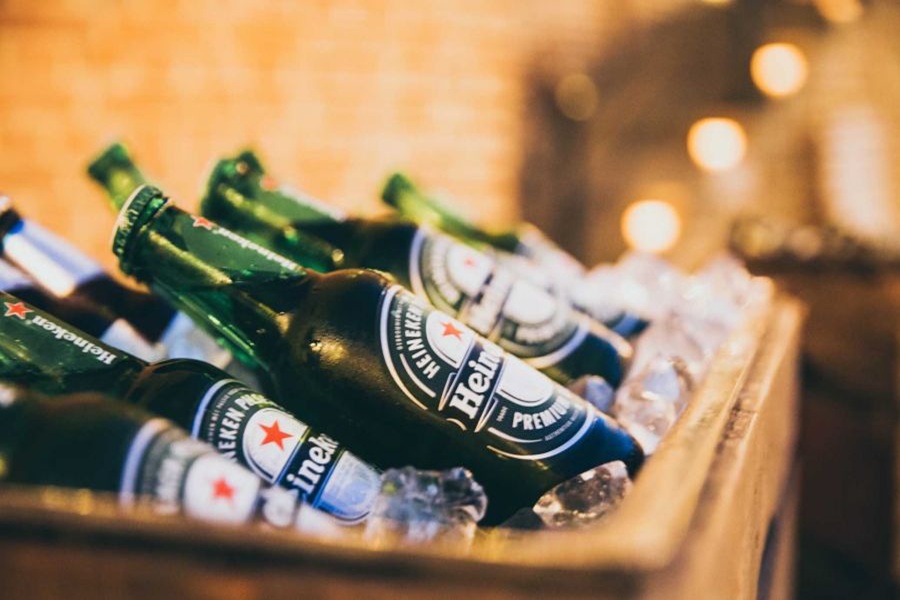
Heineken is everywhere in Greece—sometimes even more than back home. Here’s the twist: Athenian Brewery, one of the country’s biggest, actually brews Heineken locally. So, what you drink in Athens or Santorini was brewed just a few miles away.
Some folks swear Heineken tastes different in Greece—maybe fresher, maybe not. Either way, it’s still that classic lager you know, just with a hint of Greek attitude.
Locals sometimes pick Heineken when they want something international but don’t feel like rolling the dice on an unknown label.
You’ll spot Heineken sponsoring big events on the islands or in city plazas. Last time I was in Mykonos, I sipped Heineken while watching fireworks over the harbor. It’s everywhere, but never in your face. Reliable, familiar, always ice-cold in the Greek heat.
If you’re stuck on what to order, Heineken is a safe bet—maybe not thrilling, but always solid.
Signature Greek Lagers
If you want a taste of Greece in a glass, check out these lagers. Each one brings something different, capturing the flavor and spirit of the islands and the people behind them.
56 Isles
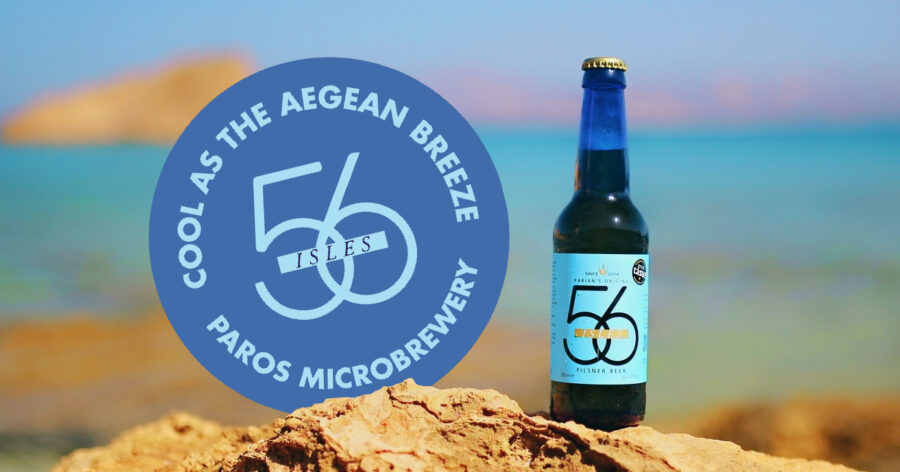
You’ll see 56 Isles on menus all over Paros and sometimes even on the mainland. The name comes from the Cyclades—there are 56 islands in the group, or so the locals say.
What’s nice about 56 Isles is that it’s not just another bland lager. It actually has some flavor. I remember my first time trying it at a taverna in Naoussa—the bartender handed it over with a smirk, like he knew I’d be impressed.
It’s lightly hopped and brewed with local barley, so it’s gentle but not boring. The malt is clean, and sometimes you’ll catch a little hint of honey, though it’s subtle.
Food pairing tip: grilled octopus or fried whitebait. If you want a Greek beer with a little something extra, but nothing overpowering, 56 Isles is a safe choice.
| Feature | Details |
|---|---|
| Origin | Paros, Cyclades |
| ABV | Around 5% |
| Taste | Crisp, malty, mild hops |
| Ideal Pairing | Seafood, salads, cheeses |
Blue Island
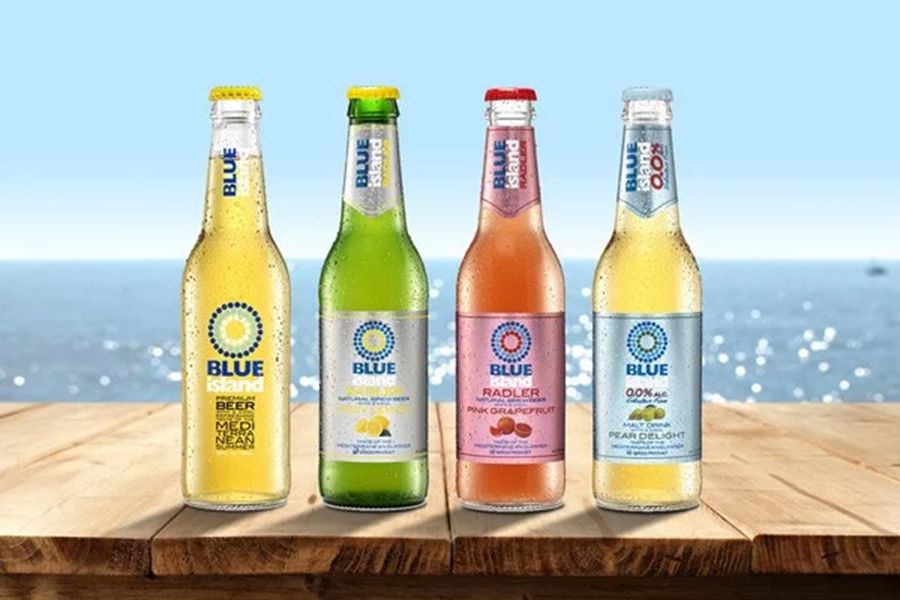
Blue Island is easy to overlook, but you really shouldn’t. It’s a straightforward lager with a twist—it’s brewed using spring water and barley from Rhodes.
People don’t always talk about the water, but Greeks insist good water makes better beer. I tried a bottle at a loud family lunch, and even my picky uncle liked it.
Blue Island finishes clean and has a golden color that looks great in the sun. Drink it cold and it’s just plain refreshing. No strong aftertaste, just a light malt and maybe a whisper of citrus.
It’s not trying to be fancy, and that’s a good thing. When you’re out with friends by the sea, you want something simple and easy to drink.
Quick tip: Blue Island goes great with grilled souvlaki or even just a bag of chips. It’s a lager that does what it promises—sometimes you just want a cold, honest beer after a long day.
Ingredients Used in Greek Beer
Greek beers stand out, partly because brewers here are pretty picky about what goes in the bottle. You’ll find Greek barley and special local hops doing most of the work, and every brewery seems to have its own take on these basics.
Barley from Greek Regions

Barley is the backbone of most Greek beers. Grab a bottle from an Athenian or Thessaloniki brewery, and chances are, the grain grew not far from where they brewed it.
ALFA is a good example—they make a point of using 100% Greek barley, harvested from places like Thessaly or Macedonia.
Local barley isn’t just about national pride. It actually gives Greek lagers that faint, sweet breadiness.
I once chatted with a brewer who joked that you can spot a beer made with imported grain because it just “doesn’t taste like home.” Some breweries blend in a bit of wheat, corn, or rye—especially in seasonal or craft batches. The difference is subtle, but if you like tasting for details, you’ll notice.
People here trust local farmers, which pays off for freshness. There’s something satisfying about drinking a pale lager and knowing the barley was waving in a Greek field just months ago. Maybe that’s a romantic thought, but hey—it sticks with you.
Unique Hop Varieties
Hops really make things interesting, especially if you actually want your beer to smell like something. Greek brewers mix it up, using both imported hops and a handful of homegrown ones. You’ll spot a lot of pale lagers with pretty mild hops, so the bitterness is usually more of a whisper than a shout.
The craft beer scene is shaking things up, though. Volkan Beer, for example, throws in a local hop blend along with honey and botanicals from Santorini. You get these gentle herbal notes—sometimes citrusy, sometimes floral—that you just don’t find in mainstream imports. Isn’t it kind of wild that you can actually taste Greece’s landscape, not just read about it on the label?
Brewers pick hops to balance out Greek barley’s sweetness. Sometimes you’ll finish a beer and catch a hint of spice or tropical fruit, which isn’t really what you’d expect. Most breweries play it close to the chest about which hops they use, but a few have admitted to using landrace Greek hops—the wild ones—just to keep things interesting. So, you might sip something in Athens and think, wait, I’ve never tasted hops quite like that before.
Greek Beer vs. Wine Culture
Greek drinking culture is woven right into the food and social life. Wine’s got the longer history, but beer fits in pretty well these days—locals drink both, depending on the moment.
Local Pairings and Traditions
If you’ve ever sat down at a taverna by the sea, you’ll see how wine just slips right in with most Greek meals. A crisp white with grilled fish, a bold red with lamb—it just works. That’s no accident; Greeks have turned wine into an art over centuries.
But here’s what caught me off guard last time I visited: beer actually holds its own with certain foods. You’ll see people with a cold lager next to spicy grilled sausages, fried calamari, or mezedes (those little appetizer plates). Sometimes, beer just feels more refreshing when the sun’s beating down. Locals reach for it with street food or after a long day, especially in the summer.
It’s not just about the food either. Wine usually gets poured for those slow, lively meals. Beer is more casual, perfect for laughing with friends under string lights or kicking back after a swim. Both have their own charm, honestly, and Greek hospitality makes space for whatever you’re feeling.
Changing Drinking Habits
Even just a couple decades ago, beer didn’t have much of a foothold in Greece. Wine totally ran the show, especially at family tables and holidays. Maybe that’s because so many Greeks still grow their own grapes or make tsipouro and wine at home (my neighbor on Paros is still at it).
That’s shifting now. You see microbreweries popping up everywhere—on the islands, in the cities. There are IPAs from Crete, wheat beers from Thessaloniki, and beers with honey or citrus notes. Young Greeks are more likely to grab a beer at a café or beach bar, especially if it’s local and craft.
Alcohol is still about connecting with people, but the way folks pick between wine and beer feels way more open and modern. There’s less formality, more curiosity. Whether you’re in Athens or a tiny village, you’ll see both drinks flowing, side by side, and honestly, that mix says a lot about Greece right now.
The Greek Beer Market Today
Greek beer isn’t just those bright lagers you see on the islands. The market’s moving, with big names and small-batch makers shaping what ends up in your glass. If you’re in Greece, you’ll notice old favorites right next to creative new brews.
Market Trends and Growth
The beer scene in Greece has changed a lot over the last decade. Where you used to see mostly mass-market labels—Mythos, Fix, Alfa—now people reach for craft and specialty beers too.
Beer prices are still pretty reasonable, whether you’re at a packed taverna or a chill beach bar. You’ll find both local and imported choices, but there’s a lot more pride in the homegrown stuff these days. Greek breweries use local ingredients like Greek barley, and yeah, you can actually taste the difference.
A few years ago, you wouldn’t stumble upon many limited-edition or seasonal beers. That’s changed—breweries are experimenting all the time, so every trip to the mini market can turn up something new. If you want to spot what’s trending, just watch what the locals order.
Craft Beer Scene

Let’s get into Greek craft beer. My first real taste was in a tiny bar in Thessaloniki, where the bartender slid over a glass of deep amber ale. It was nothing like the Mythos I’d been drinking at the beach.
It’s not just the big cities either. From Crete to Corfu, small breweries are opening up everywhere, each one trying something different. You might find hazy IPAs, Belgian-style blondes, or beers aged with local herbs. There’s no single “typical” Greek craft beer, honestly.
The best part? Most craft brewers are happy to chat if you ask. They’ll tell you how they started—usually in a garage—where they get their barley, or which wild yeast gave their beer that hint of wildflowers. Beer festivals and tasting tours are popping up, so if you’re even a little curious, you’ll get to sample a bunch in one go.
Popular Greek craft breweries you might run into:
- Septem (Evia)
- Solo (Crete)
- Noctua (Athens)
- Strange Brew (Athens)
So, if you’re into beer, don’t just stick with the basics. The craft stuff really shows off what’s new in Greek beer, and honestly, it’s part of the fun of traveling here.
Where to Enjoy Greek Beers
The best Greek beer experiences blend tradition with a bit of adventure. Whether you want to sip a cold one by the sea or meet a brewer, Greece has plenty to offer.
Tavernas and Beach Bars
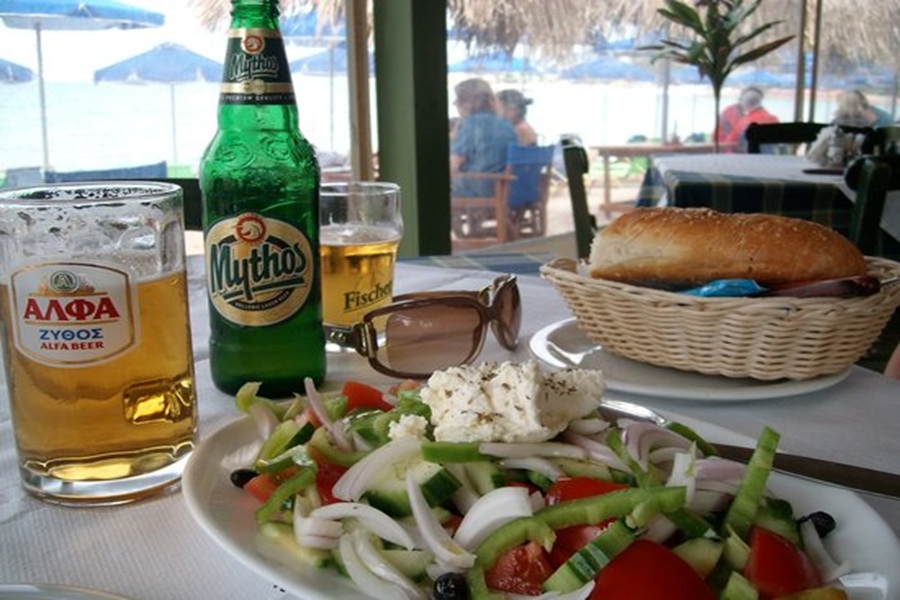
If you’ve eaten at a Greek taverna, you know a cold beer just fits with grilled octopus or a plate of salty feta. You’ll see brands like Alpha, Fix, Mythos, and sometimes a craft bottle clinking around on little wooden tables. Locals and tourists mix together, ordering beers with meze. It’s noisy, it’s happy, and it’s a great way to spend an evening.
Right by the beach, you can walk up to a bar with your toes still sandy. Most beach bars on the islands (like Naxos or Paros) and in Athens have at least a couple Greek lagers—sometimes even a tap or two of craft beer if you ask. Personally, I love nursing a Fix under those glowing palm umbrellas, with salt in my hair from swimming.
Here’s an underrated move: try a Greek beer with fresh calamari, watching the sun drop over the water. The beer’s always ice-cold, and the setting just makes it taste better.
Brewery Tours and Tastings
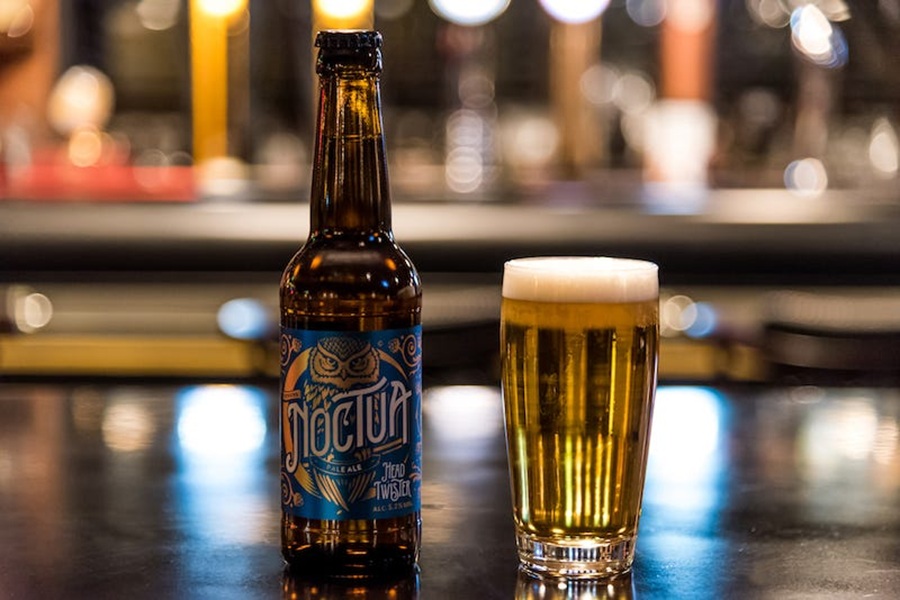
Greece’s microbrewery scene is quietly booming. Take Athens—lots of small breweries are popping up in hip neighborhoods. Places like Strange Brew or Noctua invite you in for tastings, and staff usually love chatting about what makes, say, a wheat ale from Santorini different from one in Thessaloniki.
Even on the islands, you’ll find breweries like Volkan on Santorini or Rethymnian in Crete, where you can book a quick tour and sample beers right at the source. It’s a local way to get to know a place, chatting with the brewer or other travelers. Sometimes you’ll stumble into a pop-up tasting at a festival or market that’s not in any tourist guide—I ended up at one in Thessaloniki last spring and left with a new favorite Greek pale ale.
If you want to go off the beaten path, a brewery visit is a fun, relaxed way to dig deeper into Greek culture. Who knows—you might just find your new favorite drink.
Frequently Asked Questions
Greek beer brings together unique local flavors and some familiar international styles. Whether you’re in a laid-back village or the middle of Athens, you’ll come across breweries and tastes you might not expect.
What are some of the traditional beer varieties unique to Greece?
You probably think of ouzo and wine first when it comes to Greece—fair enough! But Greek breweries have their own beer traditions. You’ll find pale lagers everywhere, light and refreshing for those hot afternoons.
A few breweries, especially on the islands, are making honey beers and fruity wheat ales. In some local spots, you might even find rustic pilsners or quirky ales inspired by Greek ingredients and myths.
What distinguishes Mythos beer from other Greek beers?
Honestly, Mythos is kind of the Coca-Cola of Greek beers. It’s everywhere, especially in touristy areas, and people love it because it’s straightforward and easy to drink. Mythos is a light lager—simple, crisp, and pretty mild.
I always think of it as a go-to for lunch by the beach. Don’t expect bold flavors or wild experiments, but sometimes you just want a cold, reliable beer.
Which Greek beers are considered the best by local connoisseurs?
Ask a few Greeks about their favorites, and you’ll get a dozen answers. Still, some names come up over and over: Alfa, Fix, and Vergina are on a lot of Greek tables.
Beer fans in Athens and Thessaloniki get excited about microbreweries like Septem or Nissos—they make beers with more hops, deeper flavors, and honestly, a lot more personality.
Can you name some Greek beer brands that are available in the USA?
A few Greek beers have crossed the Atlantic. Mythos is the one you’ll see most often—I’ve spotted it in random liquor stores in New York and Chicago. Alfa and Fix show up in some Greek or Mediterranean shops, but it’s kind of hit or miss.
Smaller craft labels are tough to find—you’d probably need to hit a Greek festival or do some serious online sleuthing.
How does Alfa beer compare to other beers in the Athens beer scene?
If you want to drink like a local in Athens, order an Alfa. It’s been around forever (well, since the 60s), and it definitely has that old-school vibe. Taste-wise, it’s a smooth lager, a bit sweeter than Mythos, and I think it pairs really well with mezedes—those little shared plates.
Compared to all the new craft beers in Athens, Alfa is more classic and less daring, but honestly, that’s what makes it charming.
What are the signature beers one should try when visiting Santorini?
Santorini isn’t just about chasing sunsets or snapping photos of those iconic white houses. Believe it or not, the island has a handful of microbreweries that are totally worth checking out.
Go for Yellow Donkey or Red Donkey—the names stick with you, and honestly, these beers have way more personality than your typical lager. If you’re feeling adventurous, there’s Crazy Donkey too, which is their strong, hoppy IPA.
Sometimes, you’ll even come across a wheat beer brewed with local citrus. Or maybe you’ll find an ale sweetened with honey, especially if you wander off the main tourist drag.


